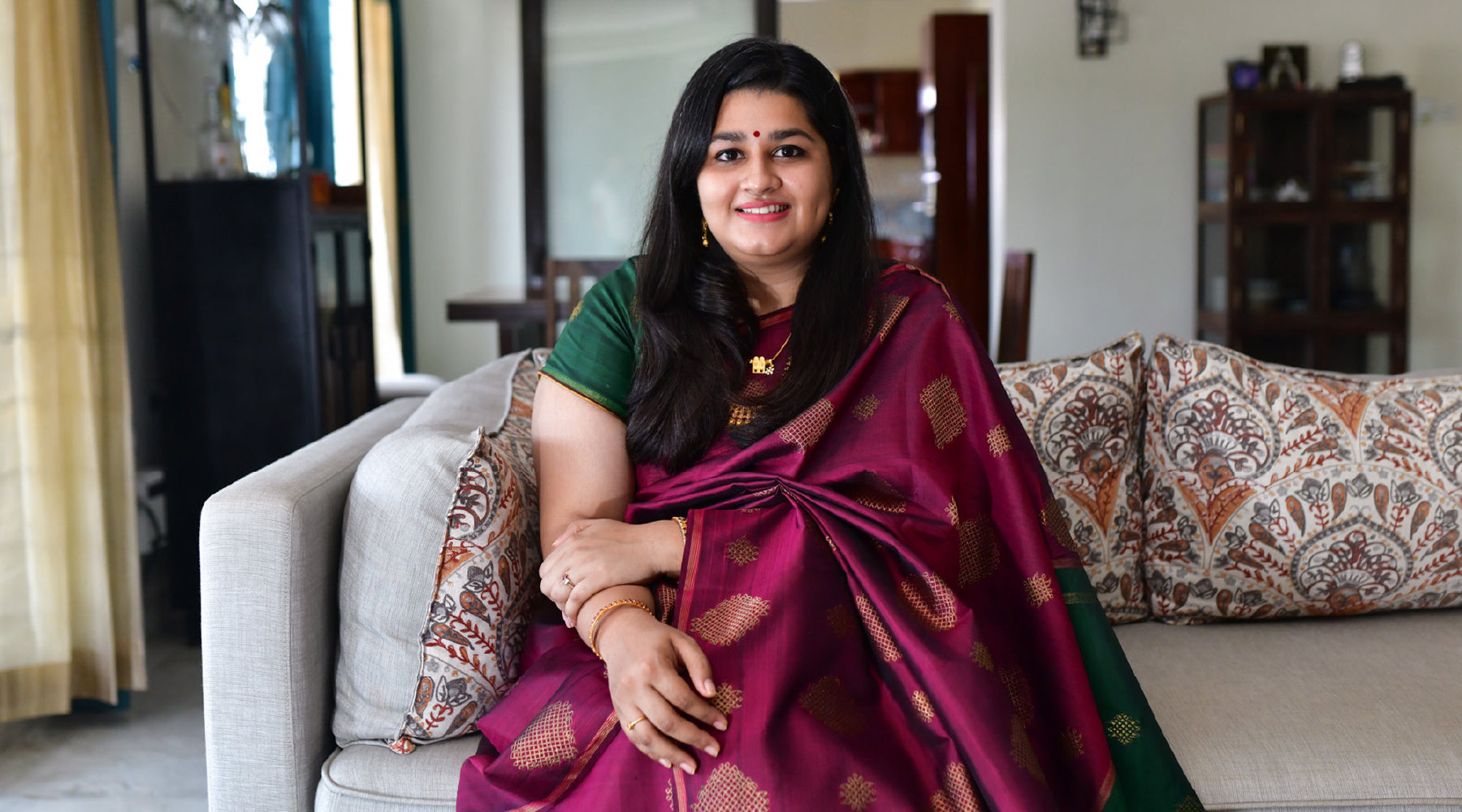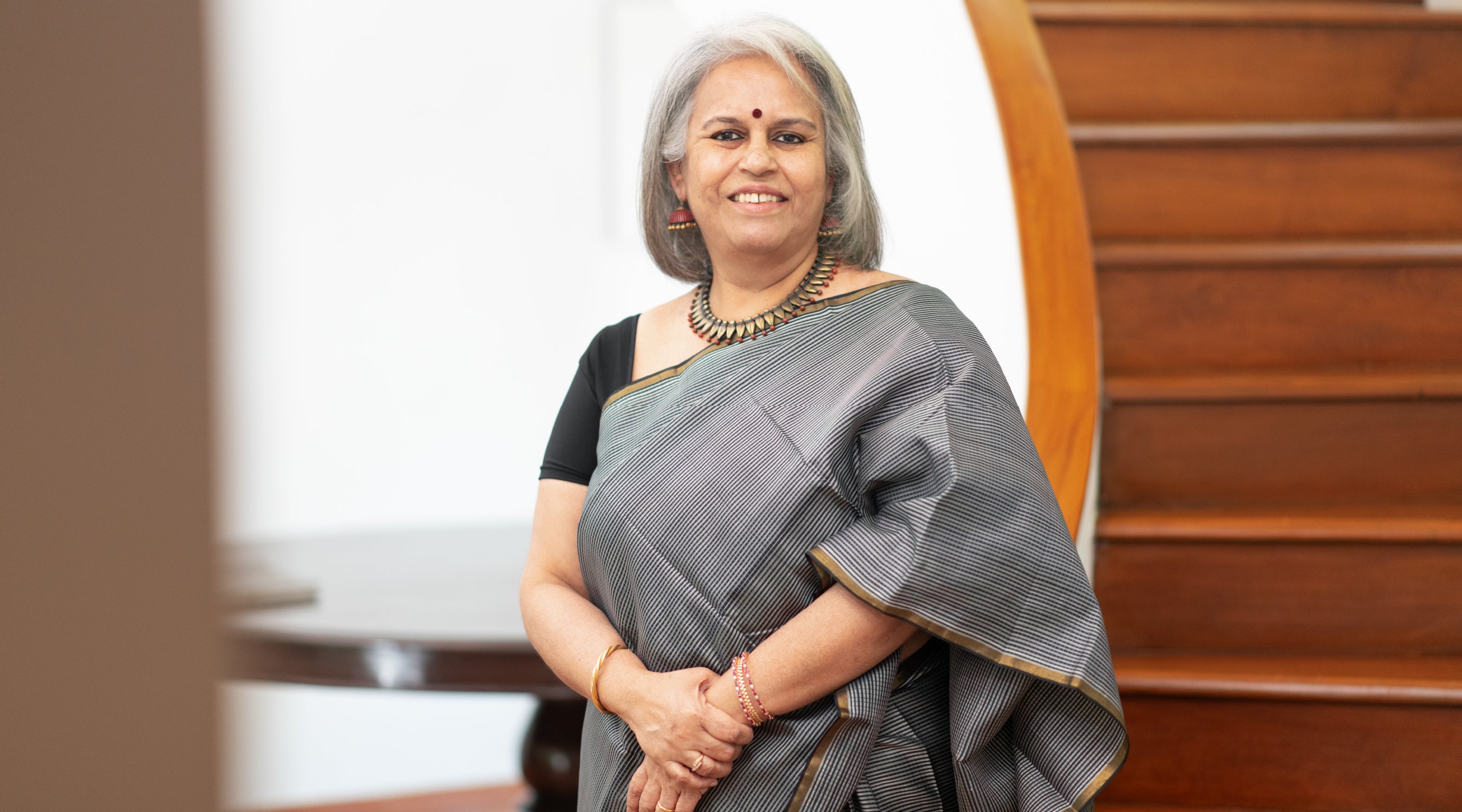KANAKAVALLI VIGNETTES : Shanno Ravi - Home And Away

Kanakavalli’s November Vignette Shanno Ravi spent the first eighteen years of her life living across the African continent, before moving to India which is now her home. In this delightful conversation with Aneesha Bangera for The Kanakavalli Journal, Shanno reminisces about her childhood, from being waylaid by wild elephants on a safari, to learning to tell which wild berries were edible, as well as about her journey to India as a young adult. Coming back to the present, Shanno tells us about discovering a love for running, and about the unique experience of running half marathons with millions of people, and yet feeling entirely and powerfully alone. Shanno finds her work with the Rotary immensely rewarding, while travel is integral to who she is. Taking a moment to browse through the Kanakavalli repertoire, Shanno curates a selection of fine kanjivarams that speak to her sense of understated elegance. Excerpts from the conversation below…
Home and Away
Tell us a little about your childhood in Africa. What are some of your most vivid memories of growing up there?
In the early years, I didn’t see myself as an Indian in Africa—it was just my home. Africa was all I knew growing up and it was my normal. I was born in Tanzania in East Africa, after which we moved to Zambia in central Africa, then Nigeria in the West, and our last few years were in South Africa. I spent almost 18 years of my life there, as we moved across the continent. The language and terrain changed with every country, but Africa was what was familiar to me.
I vividly remember my parents speaking to each other in Swahili when they didn’t want us children to understand what they were saying. Swahili was the first language they learnt, and it is so beautiful to listen to. To this day, when they want to have a private conversation, my parents switch to Swahili.

Above: (left to right) Shanno as a child in Zambia; As a baby with her father, with Mount Kilimanjaro in the background.
In some ways, our lives as expats were privileged and protected. We lived in gated communities, and had access to things that weren’t easily accessible to a large part of the population. At the same time, though, when hardship hit, it hit everybody no matter where they came from. I remember long power outages and severe shortages of water. There were times, not unlike the early days of the pandemic, when people would panic and stock up on groceries for weeks. We started growing vegetables in the back garden, not knowing when things would be available in the market again. I love that I had this experience and this incredible exposure—to both the good times and the challenging ones.
As a child, I used to observe those around me and pick up their habits. I remember tying my youngest brother to my back with a cloth so I could carry him with my hands were free, the way I saw women carrying their babies. We’d pick out wild berries, knowing almost instinctively which ones were good to eat and which were poisonous. We even learnt to tell which bugs were edible! We were exposed to everything that the local children were exposed to, and these are some of my most cherished memories.

Above: Shanno as a child at a friend's birthday party in Nigeria.
Every country had its own charm. In East Africa, the highlight was the safaris, the adventures and the wildlife. We once got stuck in a jeep facing a herd of wild elephants, and couldn’t move an inch for several hours. In Nigeria, we were close to the Sahara Desert, and there was so much beauty in that harsh terrain. I’ll never forget the Harmattan winds, when the sky would be clear and blue one moment, and the next everything would be covered in sand and the entire landscape would be blackened.

Above: The Harmattan Winds - Img source : Best Weather Inc.
How did your upbringing in another country influence and inspire your ideas of culture, tradition and home?
As a child, I would visit India once a year with my family for a holiday. We would meet relatives, discover a little of India, and my mother would do her sari shopping for the next year. But even while in Africa, we stayed closely connected to Indian culture. Every single festival was celebrated in the community, irrespective of one’s faith or the state you came from. Parents took it upon themselves to ensure their children had a sense of their roots. Every occasion involved women gathering to cook up a feast, organise games and events. We thus came to learn about food from all over India, while also exploring the local cuisine.
While I was growing up, Africa was a melting pot of cultures, with people from the UK, the Philippines, other African countries, and all over Asia. There was great diversity and everyone shared a little of their home country with each other. One of the things I love about Africa is that while they embrace the West so easily, they also hold tightly to their traditions, whether in clothing, food, dance or music. While I have spent the greater part of my journey in India, I definitely have a soft corner for Africa. My brothers and I like to think that we have African dance in our genes. I find myself instantly forging a connection with anyone who has lived in or is from Africa. I think I will always have a deep attachment to the place I grew up.
What was your experience of moving to India?
Moving to India for college was a little harder than I thought it would be. Outwardly I was the same as everyone else in my hostel and college, but I found it difficult to pronounce some Indian names and to sit cross-legged. This made people look at me differently initially—they expected me to know things that did not come naturally to me. On the other hand, I felt as though there were some things about India and its culture that I knew better than my peers. For example, thanks to my mother I could tie a sari better than most of them! The challenge was in straddling the two worlds, and I eventually managed to navigate through this.
While my parents still lived in Africa I would visit every year, but gradually I built more relationships here in India. India has always been a part of who I am, and now it is my home.
I went on to marry into a family of highly accomplished ENT doctors who run one of the largest private ENT hospitals in India, well recognised around the country and world. My father-in-law started the hospital in 1973, and my husband has run it for the last 25 years. I run the administration of the hospitals, its various centres and its charity hospital—the job keeps me on my toes, and is a journey of constant learning.

Above: Shanno with her family at her father-in-law's 80th birthday celebrations.
How did you discover a love for running? Tell us a little bit about your journey.
A few years ago, I had a fairly good fitness routine going, and running seemed to be the next step of that journey. Someone suggested I do the Delhi half marathon, and while I didn’t know anything about a half marathon other than the fact that it was 21km, I thought, “Why not?” I trained for the event, but it turned out to be so much more than I expected. The experience of running with millions of people in a circuit, getting to see the city through an entirely new perspective, and having complete strangers cheering you on along the way was just amazing. There’s something I love about running—you can be running with thousands of others but still feel like you are entirely alone. It is a personal journey, and you are in a cocoon of your own even when you are surrounded by people.
That first experience got me hooked, and I decided I’d sign up for more half marathons, each time in a new city. So, I ran in Bombay, Auroville, Bangalore and of course Chennai, and each run had its own charm. I even got a little adventurous and convinced some members of my family to come with me to run the Penang Bridge Marathon! It was one of the quietest and most clinical runs—we could hear nothing but the patter of feet, unlike in India where there are crowds cheering, bands playing music, and a whole lot of noise.
At some point, I fell off the wagon, but I hope to get back to running very soon. In line with this, because it also requires discipline, training and fitness, I want to start trekking. I dream of one day going back to Africa to summit Mount Kilimanjaro in Tanzania. At the foothills of Kilimanjaro is a small town called Moshi, where I was born, so this is a sentimental ambition; a way for me to go back to my roots.

Above (left to right): At the Auroville run with her husband Ravi; Fun times with the Rotary
What does the idea of service mean to you, especially in the context of your work with the Rotary Club of Madras?
I have been in the Rotary for 21 years, and the Rotary Club of Madras is now 92 years old. I have always been in awe of how much incredible work the Rotary does without making a big fuss about it. This is the beauty of the movement across the world—where great changes are taking place, but the cost of service is marginal. Almost everything that comes in as donations goes out to the beneficiary. We also have such fun when working together on community projects. There is an ongoing debate, because the motto is ‘Service Above Self’, but fellowship is such an integral part of the Rotary and people often ask, is it service first or fellowship first? I personally believe that it is the strong fellowship and camaraderie between members that makes the service we do so much more effective. We have worked on a number of projects, from building schools to eradicating Polio. I have only recently learnt the art of asking for money—someone told me that when you are asking for others and not for yourself, you should never hesitate to ask for help. And I love that. Everyone contributes in their own ways, and every little bit counts.
I find the work with the Rotary very rewarding. Not only is the idea of service very close to my heart, but I also truly enjoy the company of the other members, the feeling of working together to bring about change, and of course, the opportunities I get to dress up for events!
What do you love most about travelling? Can you tell us about some of your favourite memories of travel?
I think travel has been an integral part of who we are as a family, simply because of our life in Africa, moving between countries and visiting India often. I have lived in five countries, and in every single one there’s been so much to see. Whether it’s the Victoria Falls which was just a hundred kilometres from where I lived at one point, or trips to Malawi and Botswana. Looking back now, I think we might have taken all these travel experiences for granted.
I’m glad that I’ve been able to travel extensively not just abroad but within India as well. I think there’s so much to see and discover in our country—whether you’re looking for beauty, adventure or relaxation. These days I enjoy travelling with groups of friends, seeing things from a different perspective. We create wonderful pockets of memories with each experience. Most recently, one of the most enjoyable trips was to Japan with my son who is a big foodie. I’m usually the one doing all the planning, but this time he organised everything and we did a Japanese food trail. It was exciting to be led for a change, and to see a beautiful country through the lens of its food. My husband and I are looking forward to exploring more of India once travel restrictions open up.

Above (left to right): Shanno and her son in Japan; A trip to Jaisalmer in Rajasthan with her family; Shanno with her husband and son at Lake Tahoe some years ago.
How do you define tradition and beauty?
I love the fact that we have traditions—they give us a sense of belonging. Traditions help us pass on the way things are done in a family or a society. I am open to tradition as long as it doesn’t become rigid or an imposition. I’m wary if it blinds people, but I celebrate the feeling of connectedness it brings. I believe that no matter the faith you follow, there are certain things that are passed on through the generations. It’s important to embrace it, because tradition is what keeps culture going, and without it we’d all just be clones of each other.
I find beauty in everything around me. I think beauty lies not only in what you see, but also in the way you see it.

What role does the sari, and the kanjivaram in particular, play in your life?
I believe that the sari is an absolutely beautiful piece of clothing. It can be draped in so many different ways, to suit the colours, textures, designs and fabrics—everything about it is elegant. My mother has been a big influence on me in terms of how I view the sari. Growing up I watched her drape them so beautifully. I remember her not just shopping for saris while on holiday in India, but also getting blouses stitched, finding matching jewellery, bangles and bindis. We did most of this shopping in Tamil Nadu, where the kanjivaram holds pride of place. For a special occasion my mother always chose a kanjivaram.
When I got married, I watched my husband’s grandmother wear a kanjivaram every single day—for her it was like a second skin. She hand-washed her kanjivarams every day, and it had a place in her daily life, not the position of luxury we now give it. My mother-in-law is also a kanjivaram aficionado, who makes sure she has a new sari for every occasion or event, no matter how small. Gradually the kanjivaram has come to be a big part of my life too.
I like understated elegance. I love plain saris with big borders, or with interesting pallus. This simple but gorgeous black and gold kanjivaram is one of my favourites, with its striking peacock motif on the pallu.

Shanno wears a Kanakavalli sari in black with gold zari bands on the borders and an asymmetric pallu featuring peacock, tiger, deer and floral patterns all in rich zari.
- Shanno Ravi, in conversation with Aneesha Bangera, photography by Raghuram Vedant.
View Shanno's accompanying guest curation here.



